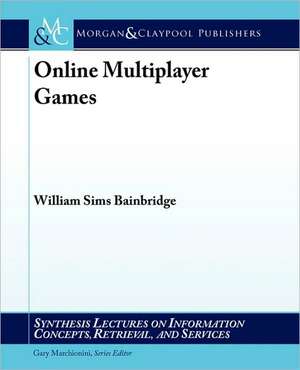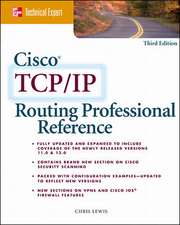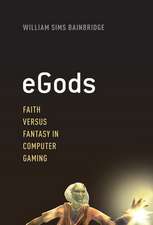Online Multiplayer Games: Synthesis Lectures on Information Concepts, Retrieval, and S
Autor William Sims Bainbridgeen Limba Engleză Paperback – 13 ian 2010
| Toate formatele și edițiile | Preț | Express |
|---|---|---|
| Paperback (2) | 167.08 lei 6-8 săpt. | |
| Springer International Publishing – 13 dec 2009 | 167.08 lei 6-8 săpt. | |
| Morgan & Claypool – 13 ian 2010 | 245.55 lei 6-8 săpt. |
Preț: 245.55 lei
Preț vechi: 306.95 lei
-20% Nou
Puncte Express: 368
Preț estimativ în valută:
46.99€ • 50.24$ • 39.18£
46.99€ • 50.24$ • 39.18£
Carte tipărită la comandă
Livrare economică 18 aprilie-02 mai
Preluare comenzi: 021 569.72.76
Specificații
ISBN-13: 9781608451425
ISBN-10: 1608451429
Pagini: 114
Dimensiuni: 191 x 235 x 6 mm
Greutate: 0.21 kg
Ediția:New.
Editura: Morgan & Claypool
Seria Synthesis Lectures on Information Concepts, Retrieval, and S
Locul publicării:United States
ISBN-10: 1608451429
Pagini: 114
Dimensiuni: 191 x 235 x 6 mm
Greutate: 0.21 kg
Ediția:New.
Editura: Morgan & Claypool
Seria Synthesis Lectures on Information Concepts, Retrieval, and S
Locul publicării:United States
Cuprins
Introduction.- Historical-Cultural Origins.- Technical Constraints.- Rolecoding and Social Control.- Personality and Motivation.- Avatars and Characters.- Virtual Professions and Economies.- Social Relations Inside Games.- Implications for External Society.
Notă biografică
William Sims Bainbridge is the author of 18 books and about 200 articles in the areas of sociology of technology, social movements, and research methodologies. For his recent book, God from the Machine, he programmed a neural network multi-agent system to simulate religious cognition and conversion in a large community. His book about World of Warcraft, The Warcraft Civilization, has recently been published by MIT Press. After organizing the first large scientific meeting inside World of Warcraft in May 2008, he edited a book growing out of the proceedings, Online Worlds, published by Springer. He spends well over a thousand hours each year doing observational research inside virtual worlds, and he is currently writing a pair of books on how gameworlds explore both the future and the past of humanity. For the last seventeen years, he has served as a program officer managing review of grant proposals in the social science and computer science directorates of the National Science Foundation. He has extensive experience editing publications on the societal implications of nanotechnology, converging technologies, and human-computer interaction.






















